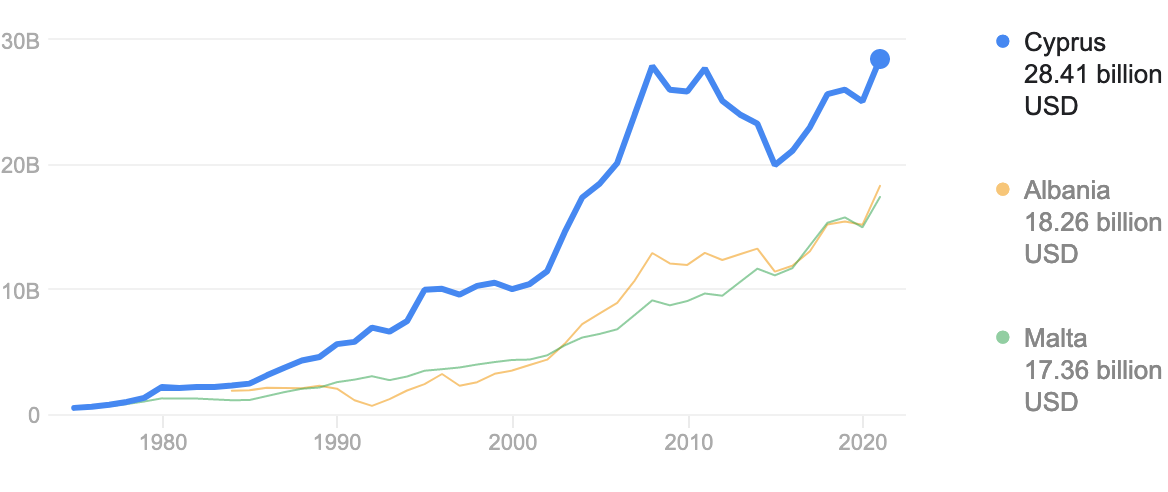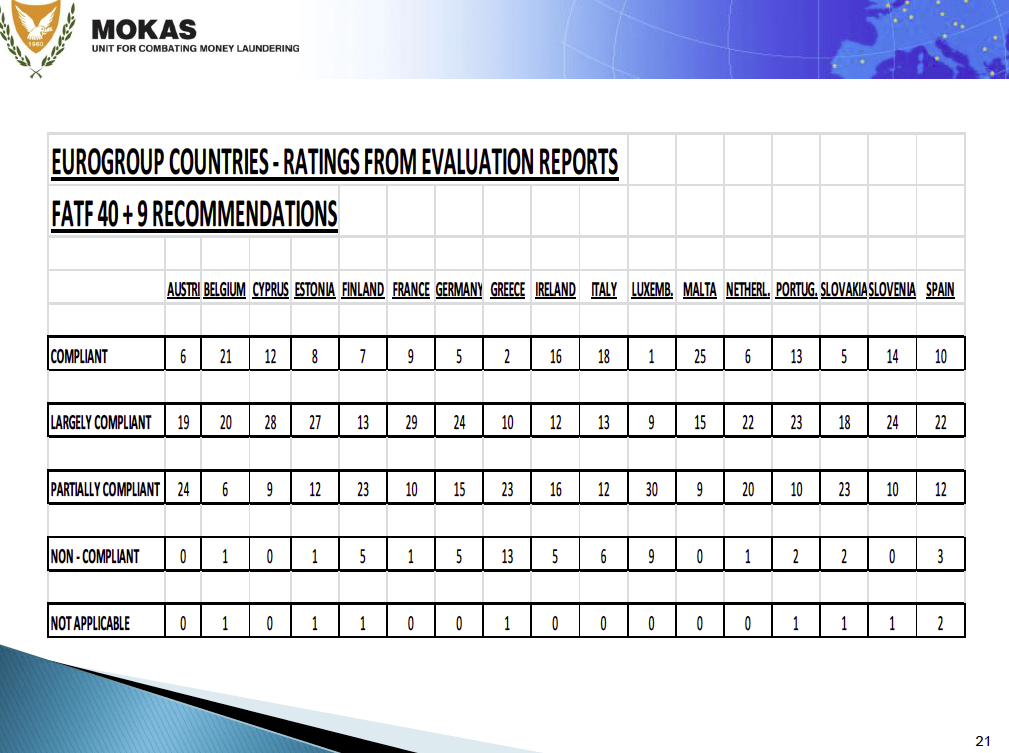Your humble blogger took a gander through NC archives, to see if her recollection that the cramdown of Cyprus depositors to bail out its banking system, a measure never before or since taken in the Eurozone, could be viewed as primarily intended to hurt Russia. While Europe sticking to a new bad policy of “no bailouts” which ultimately can and here did mean depositors take losses looks like the proximate cause, a widely-touted rationalization at the time was that Cyprus was a hotbed of dirty Russian money and therefore its bank depositors didn’t deserve to be treated well. Not only was that false, but big economic significance of Cyprus to Russia was as a conduit for foreign investors, including respectable multinationals like BP, to make investments in Russia. So the damage to Cyprus almost certainly had an effect on Russian investments, but how much and how quickly Russia and interested commercial parties came up with new approaches is over my pay grade.
I very much welcome informed reader comment. We covered the non-bailout negotiations in depth at the time, since the deposit haircut was a terrible precedent. But it appeared depositors in other Eurozone banks concluded that bad things happened only to depositors in small and weak periphery countries or were otherwise stupid. Recall that Spain had within the last year come close to doing a bail in via having its banks aggressively pitch a “better than deposits” product: preferred stock that paid more interest than deposits with money market fund type liquidity. Then oopsie! These preferred stockholders took haircuts of 16% to 46%. That was admittedly less brutal than the 70% cramdown administered to holders of similar paper at Allied Irish Bank the year before. But yours truly is pretty sure the bank itself didn’t aggressively hawk these instruments to trusting depositors shortly before goring them.
A quick, high level recap. Cyprus was vulnerable to mishap by having an outsized banking system, with bank assets at 9x GDP. That sounds really terrible, but Luxembourg has no real economy to speak of and then had a banking system with assets at 21x GDP. And Cyprus was in large measure a victim of its big bank’s exposure to Greece. From a 2012 post:
It’s key to understand that this crisis was created by the Troika. Cyprus asked for a bailout nine months ago and the deadline is a bond payment this June. And while it has become fashionable to pin the blame for this mess on Cyprus, the backstory is more complicated. From Cyprus.com:
Not all the banks are in the same condition.
(a) Cyprus has two money-center type banks: Laiki (Popular) Bank and Bank of Cyprus.
(b) Laiki was purchased by a Greek vehicle (Marfin Investment Group) backed by Gulf money. Marfin’s purchase of Laiki took Laiki from being a fairly conservative local bank to being highly exposed to Greece. Laiki is definitely insolvent and needs to be restructured.
(c) Bank of Cyprus has been more conservative vis-a-vis Greece, but still has meaningful exposure. It is conceivable that, given time, Bank of Cyprus could survive.
(d) Beyond the main two banks, there is Hellenic Bank (a much smaller bank with much less Greek exposure), Cyprus Development Bank (no Greek exposure), the Co-ops (no Greek exposure) and the Cyprus subsidiaries of foreign banks (aka, Russian, English, etc banks), also with no Greek exposure.
(e) All the local oriented banks (BoC, Laiki, Hellenic, Coops) have exposure to the local real estate market that went through a bubble during the 2000-2009 period. This exposure however is not short-term and could be resolved over the period of years. It is a problem, not a crisis, and is offset by the fact that the two main banks have quasi-monopolistic earnings power locally. Given the time and some financial represssion (a la the United States) and the local issues would be manageable.
In other words, the bank that is the epicenter of the problem was driven into the ditch by foreign buyers. Now admittedly, the local bank supervisors did nothing to stop that, but can you point to a single national bank regulator (ex the Canadians) that put much in the way of constraints on their banks prior to the crisis?
And the idea that Cyprus is a hotbed of Russian Mafia money also appears to be exaggerated. This looks to be a combination of a need to scapegoat the latest supplicant to the Trokia plus Anglo-German prejudice against Central and Southern Europe.
In fact, only €20 billion of the €70 billion in bank deposits were from Russians. Remember that there were many Russian retirees in Cyprus, so they would be well represented in this group. Similarly, Russian businessmen serving the Cyprus market or acting as facilitators of investment into Russia via Cyprus would have offices and therefore deposits in Cyprus.
Companies investing in Russia through Cyprus would presumably need a Cyprus legal entity and therefore bank account. The reason for foreign businesses to utilize Cyprus is that its courts operate on an English-law basis and contracts written for inbound Russian investment would specify English law as governing law. And my understanding was that the Cyprus courts had a good reputation. I had a colleague who as a very small fry was extremely careful about his exposure when doing deals in the CIS. He would regularly opt for disputes to be adjudicated in Cyprus.
And since when is anyone upset by money laundering/tax losses outside their jurisdiction? Have you ever heard gnashing of teeth and rending of sackcloth over Citigroup’s long-standing and very large Latin American wealth management business, which is widely recognized to consist significantly of what is politely called flight capital? How about the notorious Belgian dentists taking suitcase money to Luxembourg?
Wikipedia is uncharacteristically even-handed in its recap:
A minority proportion of it was held by citizens of other countries (many of whom from Russia), who preferred Cypriot banks because of their higher interest on bank account deposits, relatively low corporate tax, and easier access to the rest of the European banking sector. This resulted in numerous insinuations by US and European media, which presented Cyprus as a “tax haven” and suggested that the prospective bailout loans were meant for saving the accounts of Russian depositors.
So at first blush, the rough handling of Cyprus looked to be driven by Germany’s finance minister, Wolfgang Schauble, being presented with a situation where he could give his wrathful tendencies free rein. As we and others chronicled at the time, with considerable alarm, the Trokia was determined to make the Cyprus banking system eat losses, even though they were largely Greek in origin. And the reason the depositors were bled was that if you were going the bail-in route, there were no other acceptable deep pockets. From a March 2013 post:
In an excellent and important post, “A stupid idea whose time had come,” Joseph Cotterill of FT Alphaville explains why the axe fell on the depositors. First, have a look at the balance sheet of one of the two big (and about to fall over) banks:
Notice there is pretty much squat in the way of equity and senior debt. The “other liabilities” may be secured. So then we get to liabilities to central and other banks. The liabilities to central banks are not going to be haircut; that is part of the “private sector participation” premise. Remember, banks in periphery countries have been pledging any asset the ECB will take to it, and any stuff the ECB won’t take to their own central bank. In the case of the Cypriot banks, the exposure is almost entirely that of the local central bank. Again from Cotterill:
As of January, the Cypriot central bank was extending around €9bn of secret liquidity in return for collateral no longer accepted at normal ECB liquidity ops. Much of it (it’s naturally difficult to determine how much) was probably going to Laiki.
Now remember, that’s €9 billion of Cyprus loans to the banks, mainly Laiki, which is junior to deposits, versus the €5.8 billion to be seized from depositors. So why aren’t the loans from the Cyprus central bank being written down and the Cyprus sovereign debt investors taking losses? Well, it turns out it is easier to screw retail customers than it is professional investors:
As it is, there were lots of good reasons why a sovereign debt restructuring did not happen. I don’t want to downplay them. Notably, the fact that the bonds that were best to restructure were governed under English law, and were likely held by the kind of investor who’s willing to litigate. I listed the problems here. Around it all was the inability to get write-downs out of Cypriot domestic-law sovereign debt, because that was held by the banks which already bore big black holes in their balance sheets. Again we come up to something that could be raised in the defence of the deposit levy — local exposure was so great everywhere, that any distribution of losses would have been painful. For the widow depositor, substitute the pension fund holding local-law bonds.
During the negotiations, the Troika made clear it wanted the Cyprus banks to absorb a set level of losses, and didn’t care much about how the math worked. The Cyprus government and the Eurocrats initially discussed whacking both deposits under €100,000, which were supposed to be guaranteed, and a higher expropriation on deposits over that level. The notion of “taxing” supposedly sacrosanct guaranteed deposits freaked out analysts and commentators, who argued that move could create bank runs all over the still-shaky Eurozone periphery.
In the end, deposits over €100,000 were haircut by 47.5%. Mind you, any non-trivial business will routinely have balances over that level. So we and others predicted the obvious: that the bail-in would hit the economy hard:

And big depositors suffered even if their accounts were at sound banks.
This was the thanks Cyprus got for being a good Eurozone citizen and sending €3 billion to help the Greek government.
So far, the Russian angle looks incidental, but when you dig deeper, it appears to be material. Recall in 2011, Russia gave a €2.5 billion loan to Cyprus to keep it afloat. But those funds were for the government, not the wobbly banks. Putin was reportedly ripshit at Russia not being included in the bailout negotiations.
And the Cyprus government turned to Russia for help, including asking them to bail out Laiki and offering up offshore gas assets. Then Prime Minister Medvedev bothered calling a press conference to say Russia had no idea what they were worth and the Turks were not happy (true). 1
As we wrote in a March 20 post:
The cynic in me wonders if the crippling Cyprus international banking business is not simply an accidental by-product, but in fact was the motivator for the ambush of the new [pro EU, pro austerity] President. As the Financial Times indicates, legitimate Russian businesses are scrambling to move their deals to other tax haven centers, like Luxembourg. Remember that Russia is funneling arms to Syria. That means paying arms merchants. I would assume it’s harder to move those payments quietly through banking centers in the US or UK banking complexes than one largely outside it (well, you can always use overinvoicing and other tricks, but I assume that is more cumbersome).
And on March 21, we chronicled a recent rise of non-organic messaging about the supposed Russian position in the Cyprus banking system:
This move by the EU increasingly has the smell of a proxy Germany v. Russia struggle through Cyprus. But why? I’ve had Germans say they think their future is more aligned with Russia than the US. Why go out of your way to alienate a supplier of important resources? I can’t fathom the logic here.
And there are signs the ground for a move against Cyprus was being seeded months ago. Reader Dr. Kevin sent along an article about a Russian tax fraud, Hermitage, and the headline and much of the text tries to make Cyprus somehow responsible. In fact, all the main actors were Russian and the Russian government was the loser. Our Richard Smith happens to know the case well, since it used shell companies formed by the notorious New Zealand incorporator, GT Group. Cypriot banks are known to have been involved, but to the tune of just $31Mn. At least equally at fault: New Zealand, Moldova, the UK, and, of course, Russia. Yet it is Cyprus that is attracting opprobrium (and now, much more).
In fact, if you look at real money laundering (as opposed to tax avoidance of the sort that Apple, GE, Starbucks, and a horde of multinationals engage in through various jurisdictions), Cyprus gets better marks than Germany from the official Council of Europe body that evaluated anti-money laundering measures (cumbersomely named the Committee of Experts on the Evaluation of Anti-Money Laundering Measures and the Financing of Terrorism, aka MoneyVal). See this table (full report here). Notice that Cyprus is one of the few countries that is fully complaint (click to enlarge):
And the propaganda against Cyprus started months ago. I pinged the author of the Cyprus.com articles we’ve featured, and he wrote:
Cyprus is (was?), bar none, the best jurisdiction for routing investment into Russia – it has the best treaty rates with Russia and you avoid the Russian tax/legal system.
so, it is practically malpractice NOT to structure investment into Russia as a Cyprus co.
(BP-Russia is a Cyprus company and their partner AAR are also a Cyprus company. So when they were fighting last year, they were having the board meetings in Limassol).
***
All these articles are the equivalent of “discovering and being shocked by” that 100% of public companies involved in SEC violations or 100% of LLC subs of FT 500 companies engaging in tax structuring were incorporated in Delaware. Obviously, there must be something very shady about Delaware that causes SEC violations, as opposed to noting that *everyone* uses a Delaware corp, whether they are nice, mean or indifferent.
The people who are behind these articles know better and I noticed this about 6 months ago that the drumbeat of these articles started out of nowhere and just kept repeating “cyprus = money laundering for Russia”.
As if the EU just discovered 6 months ago that Cyprus has a tax treaty with Russia…and every country in the EU, the USA that all the governments obviously voluntarily signed.
That is when I knew the setup was coming. Why now? Why so consistent? Even the FT which really should know better has basically not written an article about Cyprus in the last six months without some type of ‘shady Russian’ insinuation.
This is how this test of savings confiscation is being sold in the rest of Europe. “Yeah, I know it looks bad, but it is a special case because cyprus have all this Russian mobster money there so it is fair to take their money”
The ECB has given Cyprus virtually no runway. It’s a deal by end of Monday or off with their heads. Given the difficulty of cobbling anything else together, this would seem to force Cyprus into only being able to structure yet another variant of the “rape depositors” plan.
Back to the current post. So even though Cyprus was likely to have been treated badly by virtue of its small size and northern European prejudice against its south, the “not letting a crisis go to waste” appears to have resulted in Cypriots taking additional lumps for the purpose of getting at Russia. And ironically, Germany having been the key enforcer then is now on the receiving end via the loss of cheap Russian gas. As some readers are wont to say, karma is a bitch.
_____
1 These assets are still nowhere to being developed despite later exploration finding additional fields. In addition to Turkey engaging in threatening naval action in the area, the EU can’t get out of its own way. From Cyprus Mail in August:
The EU has been making it abundantly clear that it needs new gas supplies this decade so that it can replace Russian gas, but not beyond 2030. Its official position is that it will be reducing gas consumption as we approach 2030 and beyond, in line with its target to achieve net-zero emissions by 2050. Gas consumption in the EU has already declined by about 11 per cent year-on-year, mostly as a result of the exorbitant prices.
This is clearly spelt-out in the recent MoU signed between EU-Egypt-Israel, the term of which is restricted to 2030, without provisions to extend it.
I believe this position will be challenged in a few years when it is realised that renewables and hydrogen alone cannot provide Europe’s energy needs reliably.
But right now this is the official EU policy and it discourages oil companies and institutional investors from investing in long-term projects that depend on supplying the EU with gas
And the EU is set to miss its renewables targets:
Europe isn’t going to invest in renewables to replace Russian gas because… it isn’t going to invest in anything. Unless it gets access to sufficient gas its going to go broke, nothing will get built, and living standards will fall. pic.twitter.com/Y7vhDYTRjl
— Philip Pilkington (@philippilk) February 1, 2023



